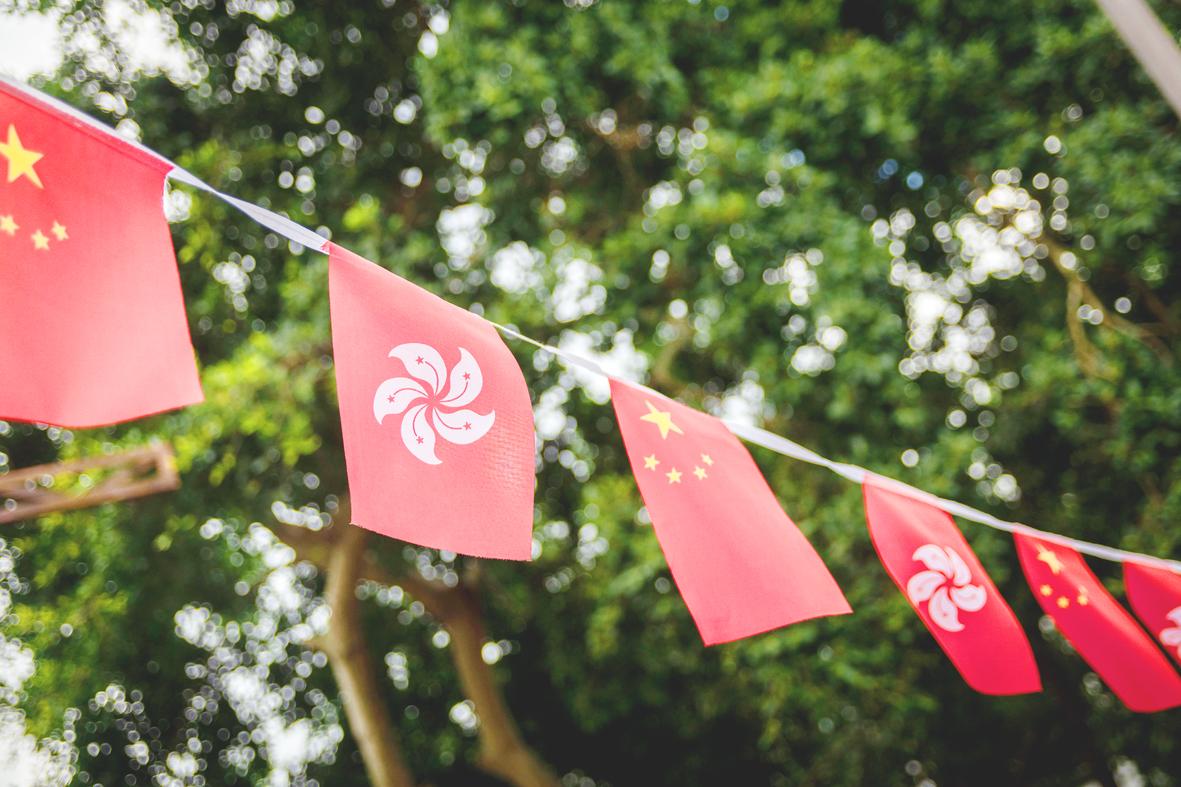Academics yesterday urged “professional assessment” by the government in response to calls to close the nation’s representative office in Hong Kong.
Taiwanese officials in Hong Kong have been told that their visas would not be renewed if they do not sign a document supporting Beijing’s claim to Taiwan under its “one China” principle, sources have said.
Several officials at Taiwan’s de facto Hong Kong consulate who were due to renew their visas have been asked by the Hong Kong government to sign the document, Reuters on Friday quoted a senior Taiwanese official with knowledge of the matter as saying.

Photo: Bloomberg
The media reports prompted increasing calls from Taiwanese online for the government to take a tough stance by closing its Hong Kong office.
National Chengchi University professor Lee Yeau-tarn (李酉潭), a researcher who specializes in politics and human rights, yesterday said that such a move would put Taiwanese working and studying in the territory at a disadvantage.
According to government estimates, 69,000 people hold both Taiwanese and Hong Kong residency, while about 5,700 Taiwanese working or studying in Hong Kong have only Taiwanese residency.
There are 11 Taiwanese officials at the representative office — which remains open — whose visas will expire in the next year or two, Lee said, adding that the government should seek to ensure that the office remains open afterward.
With international attention focused on Hong Kong, Taiwan should seek to cooperate with like-minded nations in its relations with the territory, he added.
Academia Sinica’s Institute of Taiwan History associate research fellow Wu Rwei-ren (吳叡人) echoed the sentiment, saying that closing the office would serve no strategic purpose.
“It is better to stick around until they force you out at the last minute,” he said, adding that this would highlight Beijing’s bullying for the world to see.
The requirement to sign a “one China” promise is not stipulated in Beijing’s new national security legislation for Hong Kong, he said.
The requirement was in the spirit of that law, but was not a new move by Beijing, Wu said, citing Mainland Affairs Council Macau Affairs Department Director Lu Chang-shui’s (盧長水) refusal to sign a similar document two years ago, preventing him from taking the post of representative to Hong Kong.
The Hong Kong government appeared to be putting the weight of the security legislation behind the requirement with the intention of crippling the Taiwan office’s operations, Wu said, adding that the move aims to cut off cooperation between Hong Kong and Taiwan “separatists.”
Beijing’s plan is to have the Taiwan office reduced to minimal staff so that it could do nothing more than issue visas, he said.
Taiwan’s current policies over Hong Kong and Macau will likely become unusable in the future, so the government must be proactive in designing new policies, Wu said.

The Central Election Commission has amended election and recall regulations to require elected office candidates to provide proof that they have no Chinese citizenship, a Cabinet report said. The commission on Oct. 29 last year revised the Measures for the Permission of Family-based Residence, Long-term Residence and Settlement of People from the Mainland Area in the Taiwan Area (大陸地區人民在台灣地區依親居留長期居留或定居許可辦法), the Executive Yuan said in a report it submitted to the legislature for review. The revision requires Chinese citizens applying for permanent residency to submit notarial documents showing that they have lost their Chinese household record and have renounced — or have never

A magnitude 5.6 earthquake struck off the coast of Yilan County at 12:37pm today, with clear shaking felt across much of northern Taiwan. There were no immediate reports of damage. The epicenter of the quake was 16.9km east-southeast of Yilan County Hall offshore at a depth of 66.8km, Central Weather Administration (CWA) data showed. The maximum intensity registered at a 4 in Yilan County’s Nanao Township (南澳) on Taiwan’s seven-tier scale. Other parts of Yilan, as well as certain areas of Hualien County, Taipei, New Taipei City, Taoyuan, Hsinchu County, Taichung and Miaoli County, recorded intensities of 3. Residents of Yilan County and Taipei received

Taiwan has secured another breakthrough in fruit exports, with jujubes, dragon fruit and lychees approved for shipment to the EU, the Ministry of Agriculture said yesterday. The Animal and Plant Health Inspection Agency on Thursday received formal notification of the approval from the EU, the ministry said, adding that the decision was expected to expand Taiwanese fruit producers’ access to high-end European markets. Taiwan exported 126 tonnes of lychees last year, valued at US$1.48 million, with Japan accounting for 102 tonnes. Other export destinations included New Zealand, Hong Kong, the US and Australia, ministry data showed. Jujube exports totaled 103 tonnes, valued at

BIG SPENDERS: Foreign investors bought the most Taiwan equities since 2005, signaling confidence that an AI boom would continue to benefit chipmakers Taiwan Semiconductor Manufacturing Co’s (TSMC, 台積電) market capitalization swelled to US$2 trillion for the first time following a 4.25 percent rally in its American depositary receipts (ADR) overnight, putting the world’s biggest contract chipmaker sixth on the list of the world’s biggest companies by market capitalization, just behind Amazon.com Inc. The site CompaniesMarketcap.com ranked TSMC ahead of Saudi Aramco and Meta Platforms Inc. The Taiwanese company’s ADRs on Tuesday surged to US$385.75 on the New York Stock Exchange, as strong demand for artificial intelligence (AI) applications led to chip supply constraints and boost revenue growth to record-breaking levels. Each TSMC ADR represents